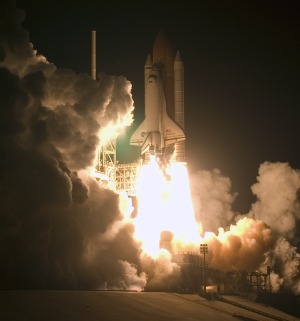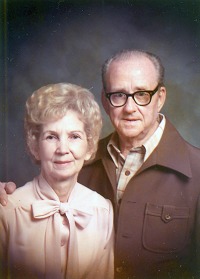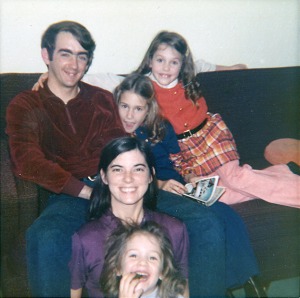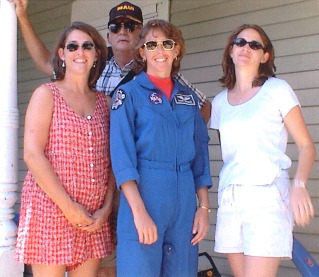
Dennis Hall’s eyes sparkle behind his glasses as he recalls the night, in 2008, when he watched his niece Sandy Magnus hurtle into space from the launch pad at Cape Canaveral.
“It was pitch black,” recalls Hall, Vanderbilt University’s vice provost for research and dean of the Graduate School. “Suddenly there’s ignition … and the whole thing lights up like an explosion … But then there’s this little line of fire that lifts up out of the fireball … It was pretty extraordinary.”
Magnus’ next launch, scheduled for July 8 aboard space shuttle Atlantis, will be a bittersweet moment for Hall, for it will be the final voyage of America’s shuttle program. “We put the shuttle program together. We put the space station in play. Now what?” he asks. “You would hope that we could continue to be forward looking and forward accomplishing.”
At 63, this soft-spoken professor of physics and electrical engineering epitomizes the forward-looking scientists of his generation. A grandson of Southern Illinois coal miners, Hall learned early the value of hard work and making one’s way in the world.

His father Eugene (“Hap”) was a bartender and his mother Mildred a sales clerk in Hall’s hometown of Belleville, Ill.; neither finished high school. Yet they saw formal education as the key to opportunity, and encouraged their children to pursue it.
Hall also grew up during the early, heady years of the U.S. space program. He was 13 when, in 1961, Alan Shepard became the first American to be catapulted through the earth’s atmosphere. Although Hall wasn’t bitten by the space exploration bug, in high school he discovered he had a “knack” for physics. Forty-five years later, science is still a thrill that he can’t help but share with others.
“Day after day, scientists in every field carry out research to uncover new truths and sharpen our understanding of what goes on in the world around us,” Hall wrote in a column published by The Tennessean last year.
“That steady, dedicated effort to explore nature’s secrets has made innovations like the laser, the GPS, computers, cell phones and more. Continued explorations are sure to lead to other unimagined wonders in the future,” he wrote. “That’s the power of science.”
Run off electrified
Hall had not yet entered high school when the first laser was produced in 1960. A decade later, the year he earned his bachelor’s degree, came the optical fiber, glass so transparent that it could carry the information encoded onto laser light for long distances. The revolution in fiber-optic communications had begun. “It was kind of the space program of the moment,” he says.

Hall earned his Ph.D. in physics from the University of Tennessee, Knoxville; his dissertation research was carried out at the Oak Ridge National Laboratory. Afterwards, he taught briefly at Southern Illinois University and worked at McDonnell Douglas in St. Louis before joining the faculty of the Institute of Optics, an academic department at the University of Rochester, in 1980.
He became internationally known for his studies of optical effects that occur near or within thin metal films and other layered surfaces like crystalline silicon, backbone of the microelectronics industry. By placing gold or silver nanoparticles on or near the surface of silicon wafers, he and his graduate students found they could increase the amount of light absorption – a discovery that has relevance for increasing the efficiency of solar power.
As he worked his way up the academic ladder, from assistant professor to institute director in 1993, Hall became equally well known for inspiring the next generation of scientists. During his two decades at Rochester, 21 of his graduate students earned their doctorates.
“I tend to be somebody who generates ideas,” he says. “You have somebody 22 years old who comes in and says, ‘I think I’d like to work for you. What do you have in mind?’ And they just run off electrified and help make it happen.”
“He was probably one of the most interactive, caring faculty members with his graduate students,” says Duncan Moore, the Rudolf and Hilda Kingslake Professor of Optical Engineering and vice provost for Entrepreneurship at the University of Rochester, who has known Hall for 30 years.
Then, in early 2000, came the phone call from Vanderbilt. At first Hall wasn’t interested in the new position that was offered — associate provost for research. But at the urging of then-Vanderbilt Provost Thomas Burish (now provost at Notre Dame), he agreed to visit the campus. During his visit, he dined with Burish and Peabody College Dean Camilla Benbow.
“It was really a wonderful evening,” Hall recalls with a chuckle. “It’s almost like Tom was setting the hook … and reeling me in.”
Question everything
“What I really liked about Vanderbilt was the widespread belief on the part of everybody I met here that the institution’s best days were ahead of it,” he continues. “The closest thing you could get to people arguing was deciding what is going to be the slope of the trajectory — not whether or not there was a positive trajectory.”
Now in his 11th year at Vanderbilt, Hall has burnished his reputation as a high-altitude thinker — and achiever. “I would say Dennis Hall is one of the more brilliant and creative science administrators in the country,” says Jeff Balser, vice chancellor for Health Affairs and dean of Vanderbilt University School of Medicine.
“Dennis utilizes his grounding in science and problem solving to … find great solutions and move us forward,” Balser continues. “[rquote]He doesn’t really accept at face value the status quo … He questions everything, and that’s why he’s such a refreshing person to work with.[/rquote]”
“Vanderbilt wasn’t initially on my radar; he put it (there),” says Sharon Weiss, a former student of Hall’s who joined the faculty in Electrical Engineering and Physics in 2005 after earning her doctorate from Rochester. A big draw, she says, was the Vanderbilt Institute of Nanoscale Science and Engineering (VINSE), “which Dennis was instrumental in getting off the ground.”
VINSE is one of 11 cross-campus initiatives created since Hall’s arrival through the university’s Academic Venture Capital Fund. Vanderbilt “used to be a fairly buttoned-down place,” he says, “but as a result of going through this exercise … I think the campus is really a lot more opened up.”
That openness has spurred new collaborations, and has helped attract research funding and top-notch faculty and trainees. In particular, Hall’s advocacy “has elevated the importance of Ph.D. education on this campus,” says Engineering School Dean Kenneth Galloway.
As evidence, Vanderbilt has seen its external research support nearly triple between 2001 and 2010, to more than $615 million. During the same period, the number of graduate students rose by a nearly third, to 2,228, as did the number of Ph.D.s – 297 were awarded last year.
In 2009, for the first time in the history of such record keeping, Vanderbilt made it into the top 20 on two prestigious annual indicators: the U.S. News and World Report’s listing of leading universities, and a ranking by the amount of federal science and engineering research grants from all agencies reported by the National Science Foundation (NSF).
Power of education
Continuing that ascent requires vigilance and a refusal to sit on one’s laurels. “I would really like to see us advance in the engineering and physical sciences sector of the university,” Hall says. “What can we do to raise the eminence and accomplishment of engineering and physical science … so it becomes something that the campus is known for in the same way it’s known for other things?”
Despite his ascent to the upper echelons of American science, Hall remains grounded in family. He and his wife Rita, who have been married for 41 years, have three children and three grandchildren.
His older brother Richard, Sandy Magnus’ father, died in 2008, but Hall keeps in frequent contact with his sister Judy, who lives in Belleville, and, of course, with his niece Sandy, who will serve as mission specialist on Atlantis.
With the dream of becoming an astronaut always in the back of her mind, Magnus followed her uncle into physics and got her doctorate from the School of Material Science and Engineering at Georgia Tech.

She explains: “In my family, we’re all fairly tenacious, and instilled with the beliefs of the power of education and that desire to go learn more and keep exploring … That certainly drives Uncle Denny.”
Graduate education and research, in particular, are intensely personal for Hall. They “create an enduring culture of advanced study that is empowering in so many ways,” he told researchers attending an NSF regional grants conference hosted by Vanderbilt in March.
“When I completed a Ph.D., and embarked on a career of teaching and research, and eventually university administration, it pulled my parents increasingly into unfamiliar territory,” Hall told the group. “If my parents were still alive today, they would be dazzled” by Sandy’s accomplishments.
“Education and research open doors,” he concluded, “by opening our eyes to new possibilities.”